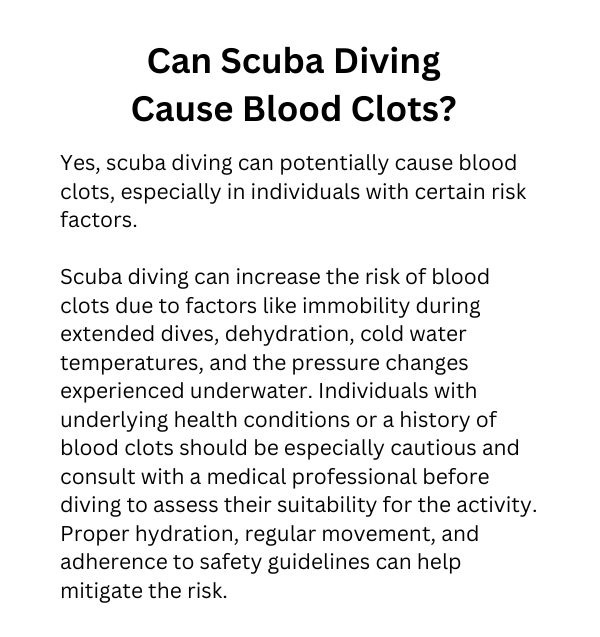Yes, scuba diving can potentially cause blood clots, especially in individuals with certain risk factors.
Scuba diving is a captivating activity that allows individuals to explore the underwater world, but like any adventure sport, it comes with certain health considerations. One question that divers, especially those with underlying medical conditions, may have is, “Can scuba diving cause blood clots?” In this article, we will examine the potential connection between scuba diving and blood clots, as well as the risk factors and precautions divers should be aware of to ensure their safety while underwater.
Blood Clots: An Overview
Blood clots, medically known as thrombosis, occur when blood cells clump together and form a solid mass within a blood vessel. Clots can develop for various reasons and in different parts of the body, but deep vein thrombosis (DVT) is of particular concern in the context of scuba diving.
Deep Vein Thrombosis (DVT)
DVT is a condition in which blood clots form in the deep veins of the legs, thighs, or pelvis. These clots can restrict blood flow, cause pain and swelling, and may potentially break free and travel to the lungs, causing a life-threatening condition called a pulmonary embolism. DVT is a significant health concern, and it’s important to understand its relationship with scuba diving.
The Potential Link Between Scuba Diving and Blood Clots
Scuba diving itself does not directly cause blood clots. However, several factors associated with diving can contribute to the risk of DVT:
- Immobility: Divers often spend extended periods in a seated or lying position on long boat journeys or during surface intervals. Prolonged immobility can increase the risk of clot formation in the legs.
- Dehydration: Divers can become dehydrated due to sun exposure, saltwater, and dry air. Dehydration can thicken the blood, making it more prone to clot formation.
- Pressure Changes: The pressure changes experienced during dives can affect blood flow. While it’s less common, rapid ascents and descents could theoretically contribute to clot formation.
Risk Factors and Precautions
To minimize the risk of blood clots while scuba diving, consider the following risk factors and precautions:
Risk Factors
- Personal Medical History: Individuals with a history of DVT or other clotting disorders are at higher risk.
- Age: Older divers may be more susceptible to clot formation.
- Dehydration: Stay hydrated before, during, and after diving to prevent thickening of the blood.
- Immobility: Move your legs and feet regularly during long periods of immobility.
Precautions
- Stay Hydrated: Drink plenty of water to maintain proper hydration levels.
- Movement: Perform in-seat exercises and leg movements during boat trips or surface intervals to promote circulation.
- Regular Diving Breaks: Plan dives with breaks to move and stretch between dives.
- Consult a Physician: If you have a history of DVT or other clotting disorders, consult a physician before diving. They can provide guidance and may recommend medications or specialized compression garments.

FAQ
Can diving in cold water increase the risk of blood clots?
Diving in cold water can potentially increase the risk of blood clots due to vasoconstriction (narrowing of blood vessels). It’s essential to maintain appropriate thermal protection and stay adequately hydrated.
Are compression garments recommended for divers concerned about blood clots?
Compression garments can help promote blood flow in the legs and reduce the risk of clot formation. Divers with a history of DVT or other clotting disorders may benefit from wearing them.
Can divers take blood-thinning medications to prevent clot formation?
Blood-thinning medications should only be taken under the guidance of a physician. Divers with specific medical conditions may be prescribed such medications to reduce clot risk.
In conclusion, scuba diving itself does not directly cause blood clots, but certain factors associated with diving can increase the risk, particularly for individuals with specific medical conditions or risk factors. Divers should be aware of these factors and take precautions to reduce the risk of clot formation, such as staying hydrated, keeping mobile during immobile periods, and consulting with a physician when necessary. Prioritizing safety and health is essential for a fulfilling and secure diving experience.
